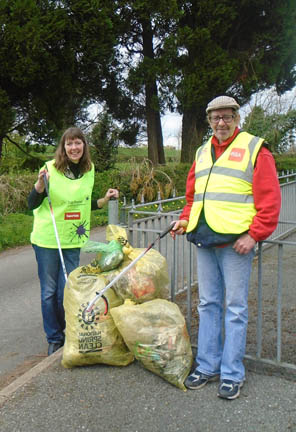Ireland’s Waste – A Poet’s Lament by Helen Harrison

They picked the ribs clean
Inside the frozen carcass
No waste in nature.
– Helen Harrison, Scavenged
If only humans were the same. Their waste is putting us all to shame.
Ireland is no exception: after a recent report that plastic pollution has entered the human food chain, it’s time for strong legislation to tackle this problem. Already much of the harm has been done. “We know they’re in the human food chain because they’re in fish, the world’s oceans, arctic ice and the stomach of marine animals” says Dr Anne Marie Mahon of the Marine and Freshwater Research Centre at the Galway-Mayo Institute of Technology. These results are cause for concern since we all know plastic is carcinogenic and the impact on human health is yet to be discovered. At the moment there is no regulation for micro plastic in here in Ireland.
It is suspected that even ‘Sea Salt’ is contaminated with plastic.
Many plastic particles such as microbeads are present in toothpaste, face scrubs, cosmetics and cleaning agents, which all cause harm to the marine environment. As far as I and many others are concerned these unnecessary components in our products don’t make for beautiful and shiny; only an uglier environment. While there is some hope on the horizon as local Government Minister Simon Coventry has moved to introduce a ban on products containing microbeads, stating that “Microplastic pollution is one of the most significant marine environmental challenges of the 21st century”, while also stating that no one country could solve the problem unilaterally. So unfortunately we still have a long way to go. LINK
Fibres from our synthetic clothing are being found in water from machine washing our clothes. These fibres have been found in Mussels, honey and sea salt. LINK
Refundable Scheme, a necessary step for Ireland
Only 14% of the world’s waste is recyclable, 8m tons of plastic, much of it packaging ends up in the oceans each year. There will always be pressure for profits from the large corporations. It is up to us to keep the pressure on them to make drastic steps to reduce these harmful products from our shops. Some large companies have developed plant-based alternatives instead of petroleum-based plastic to enable them to break down without contaminating our soil and water, though not enough companies involved to prevent at least 30% of plastic packaging ending up in landfills. One of the things we can do is insist on a ‘Refundable Scheme for plastic bottles in Ireland’ which will naturally lead to less rubbish entering our environment. Scotland is introducing one & numerous other countries like Germany have deposit refund schemes in place. There is a campaign created by Zero Waste Ireland at present calling for Denis Naughten TD (minister for Climate Action and Environment) to introduce one. Many have been signing and sharing this petition. I was involved in recent local litter picking during April as part of ‘tidy-up month’ which was taking place countrywide; I learnt lots about the problem of throwaway plastic and much of the rubbish collected from the roadsides were plastic bottles.
We live in a rural community far from shops and takeaways, but still have a significant problem with roadside litter. It should be compulsory for all householders to have to pay for regular bin collections (subsidised for those in the lower wage bracket) as some are just dumping their household waste along roadsides.
‘When it comes to waste Ireland landfills more and recycles less than the EU average’
From the most recent: ‘Measuring Irelands Progress CSO report’.
Plastic bags are still being sold in shops. I think change is needed here and people will adapt since humans are one of the most adaptable species on earth. Wildlife won’t adapt or recover from the pressure placed on them from human waste.
David Attenborough is all too aware of the danger of plastic and the reality of fish eating them.
“I’ve just finished a film on them. An albatross chick waiting five weeks for its parents to come back with food, and when the baby opens up its mouth and the mother regurgitates the contents every single thing that comes out is plastic. Everything. Everything. We are destroying Wildlife Habitats through human encroachment? We are going to be on their turf and there’s nothing you or I or anybody else can do about it. Population growth of humans is terrifying.” – David Attenborough, Radio Times.
Use it or Lose it
Those green fields unused
By human hand
Must be reclaimed
As development land,
Says the bird to the bees
Nobody sees,
Wildlife don’t mind
Absence of human kind
Speaks the squirrel and mouse
Herron and grouse
To the trees and grass
Where no fox-paws pass.
To the owners of Acres
Ready for takers
Cut flowering wastelands so:
Human waste can grow.
– Helen Harrison
————————
Originally from the Wirral in England, born to Irish parents, Helen Harrison has been living in Ireland most of her adult life. She was awarded funding during 2014 from The Arts Council of Northern Ireland for a seven day course studying poetry at The Poets House in Donegal. She has read poetry on The Creative Flow, Dundalk FM, and at various venues around Ireland. Many poems have appeared in journals and magazines. While a person who enjoys the rural life and growing flowers and herbs and foraging from the wild, she often gets the travel bug and writing is inspired by these journeys. Her first collection of poetry ‘The Last Fire’ was published by Lapwing in 2015.
https://sites.google.com/a/lapwingpublications.com/lapwing-store/helen-harrison
Some of her poetry can be found here: http://poetry4on.blogspot.ie/
Also: https://wordpress.com/stats/day/helkc4.wordpress.com



One Reply to “Helen Harrison – Ireland’s Waste – A Poet’s Lament”